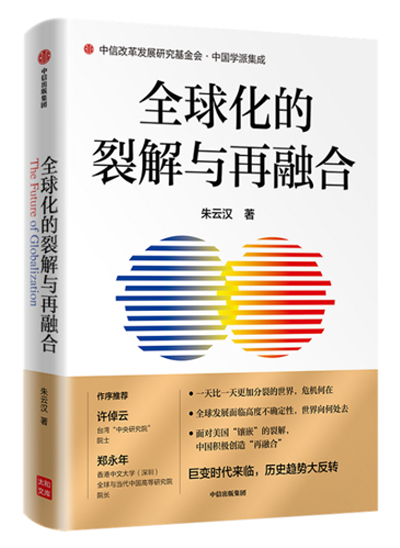A solution to disintegration of globalization

The Future of Globalization
In his The Future of Globalization, Yun-han Chu, a professor from the Department of Political Science at Taiwan University, offers a solution to the disintegration of globalization, namely,“from embeddedness to reintegration.”
The current global landscape calls for reshaping. Chu interprets the great changes in the world with an international perspective and a grand historical angle, and proposes five judgments on the transformation of the US’s strategic pattern and its strategic encirclement of China. When a major country is strategically contained in terms of the current international order or its legitimacy, its relations with other major countries will change, not only adjusting within the established system, but also having to examine problems existing in its own system. A stable context often requires the search for and creation of a universally accepted legitimacy through reform.
As a major country, China has a unique and time-honored civilization, and a culture of strategies that is full of historical wisdom. China’s soft power is shaped by the cultural concepts of the Great Unity and cooperation in the world. China’s new ideas and concepts on the new international order will help reshape the current world pattern, including the global public goods mentioned in the book.
According to Marx, human society is a system with a constantly developing and expanding base and replacement structure that purposefully accumulates the advantages of each nation, which is one of the essential differences between natural evolution and social history. We can contribute and interact with each other for the common good, accumulating the knowledge of the world, life and experience, and cultural achievements. Accumulating material or spiritual wealth over a long period of time is the main secret of the development of human civilization.
Social development follows the law of the expansion and accumulation of the basis of human civilization. Socialism with Chinese characteristics has created more favorable conditions for the new development of social production, turning them into an institutional advantage. In particular, efforts have combined the basic principles of Marxism with China’s actual conditions and the fine traditional Chinese culture, achieving a new theoretical leap that guides China’s development practice, and forming a Chinese path.
The new idea of reintegration points the way amid global competition and cooperation. As a constantly changing system, China keeps adapting to new historical characteristics in the process of development, from having identity definitions given by others with different backgrounds to gradually establishing self-identity centered on its own culture, and from seeking self-adjustments to mutual adjustments. It seeks a higher realm in global competition and cooperation, entering a higher stage of new integration through continuous negotiations and adjustments. This is also the global consciousness and resonance that are generated in the process of mutual connection, collision, and fusion.
Wang Bin is board chairman of CITIC Press Group.